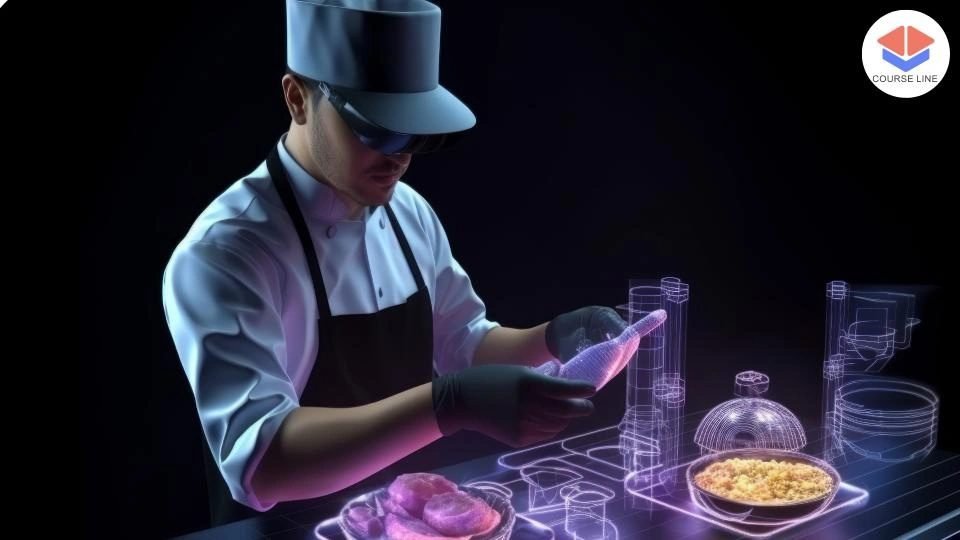Course Features
Price
Study Method
Online | Self-paced
Course Format
Reading Material - PDF, article
Duration
9 hours, 25 minutes
Qualification
No formal qualification
Certificate
At completion
Additional info
Coming soon
- Share
Overview
The Food Technology Level 8 Advanced Diploma delivers a rigorous and in-depth exploration of the modern food industry, covering everything from nutritional science and food safety to product development and emerging technologies. Starting with an introduction to the evolution and current landscape of food technology, students gain a strong contextual understanding of the field, including the ethical and environmental challenges that shape contemporary food production.
Learners dive into the science of food composition, examining macronutrients, micronutrients, food additives, and functional foods, while also learning how to interpret nutritional labels and support consumer awareness. The course progresses to essential techniques in food processing and preservation, introducing both traditional and innovative approaches like cold chain logistics, packaging methods, and shelf-life analysis, vital for maintaining food quality and safety.
Food microbiology and safety modules focus on HACCP, foodborne illness prevention, sterilisation, and risk management, supported by detailed legal frameworks. In food chemistry and quality control, students explore chemical reactions during processing, laboratory analysis, sensory evaluation, and industry quality standards. The product development section teaches the full cycle from concept to commercialisation, including market research, prototype development, branding, and scale-up production.
Advanced topics include sustainability in food systems, waste management, energy efficiency, and sustainable sourcing. Cutting-edge technologies such as artificial intelligence, 3D printing, biotechnology, nanotechnology, and blockchain are covered in relation to their application within the food sector. The course also highlights the structure of global food trade, international standards, cultural considerations, and logistics.
The final research project encourages learners to apply their knowledge through experimental design, data analysis, and the development of a sustainable food product, preparing them for practical application in professional settings or future academic research.
Who is this course for?
The Food Technology Level 8 Advanced Diploma delivers a rigorous and in-depth exploration of the modern food industry, covering everything from nutritional science and food safety to product development and emerging technologies. Starting with an introduction to the evolution and current landscape of food technology, students gain a strong contextual understanding of the field, including the ethical and environmental challenges that shape contemporary food production.
Learners dive into the science of food composition, examining macronutrients, micronutrients, food additives, and functional foods, while also learning how to interpret nutritional labels and support consumer awareness. The course progresses to essential techniques in food processing and preservation, introducing both traditional and innovative approaches like cold chain logistics, packaging methods, and shelf-life analysis, vital for maintaining food quality and safety.
Food microbiology and safety modules focus on HACCP, foodborne illness prevention, sterilisation, and risk management, supported by detailed legal frameworks. In food chemistry and quality control, students explore chemical reactions during processing, laboratory analysis, sensory evaluation, and industry quality standards. The product development section teaches the full cycle from concept to commercialisation, including market research, prototype development, branding, and scale-up production.
Advanced topics include sustainability in food systems, waste management, energy efficiency, and sustainable sourcing. Cutting-edge technologies such as artificial intelligence, 3D printing, biotechnology, nanotechnology, and blockchain are covered in relation to their application within the food sector. The course also highlights the structure of global food trade, international standards, cultural considerations, and logistics.
The final research project encourages learners to apply their knowledge through experimental design, data analysis, and the development of a sustainable food product, preparing them for practical application in professional settings or future academic research.
Requirements
The Food Technology Level 8 Advanced Diploma delivers a rigorous and in-depth exploration of the modern food industry, covering everything from nutritional science and food safety to product development and emerging technologies. Starting with an introduction to the evolution and current landscape of food technology, students gain a strong contextual understanding of the field, including the ethical and environmental challenges that shape contemporary food production.
Learners dive into the science of food composition, examining macronutrients, micronutrients, food additives, and functional foods, while also learning how to interpret nutritional labels and support consumer awareness. The course progresses to essential techniques in food processing and preservation, introducing both traditional and innovative approaches like cold chain logistics, packaging methods, and shelf-life analysis, vital for maintaining food quality and safety.
Food microbiology and safety modules focus on HACCP, foodborne illness prevention, sterilisation, and risk management, supported by detailed legal frameworks. In food chemistry and quality control, students explore chemical reactions during processing, laboratory analysis, sensory evaluation, and industry quality standards. The product development section teaches the full cycle from concept to commercialisation, including market research, prototype development, branding, and scale-up production.
Advanced topics include sustainability in food systems, waste management, energy efficiency, and sustainable sourcing. Cutting-edge technologies such as artificial intelligence, 3D printing, biotechnology, nanotechnology, and blockchain are covered in relation to their application within the food sector. The course also highlights the structure of global food trade, international standards, cultural considerations, and logistics.
The final research project encourages learners to apply their knowledge through experimental design, data analysis, and the development of a sustainable food product, preparing them for practical application in professional settings or future academic research.
Career path
The Food Technology Level 8 Advanced Diploma delivers a rigorous and in-depth exploration of the modern food industry, covering everything from nutritional science and food safety to product development and emerging technologies. Starting with an introduction to the evolution and current landscape of food technology, students gain a strong contextual understanding of the field, including the ethical and environmental challenges that shape contemporary food production.
Learners dive into the science of food composition, examining macronutrients, micronutrients, food additives, and functional foods, while also learning how to interpret nutritional labels and support consumer awareness. The course progresses to essential techniques in food processing and preservation, introducing both traditional and innovative approaches like cold chain logistics, packaging methods, and shelf-life analysis, vital for maintaining food quality and safety.
Food microbiology and safety modules focus on HACCP, foodborne illness prevention, sterilisation, and risk management, supported by detailed legal frameworks. In food chemistry and quality control, students explore chemical reactions during processing, laboratory analysis, sensory evaluation, and industry quality standards. The product development section teaches the full cycle from concept to commercialisation, including market research, prototype development, branding, and scale-up production.
Advanced topics include sustainability in food systems, waste management, energy efficiency, and sustainable sourcing. Cutting-edge technologies such as artificial intelligence, 3D printing, biotechnology, nanotechnology, and blockchain are covered in relation to their application within the food sector. The course also highlights the structure of global food trade, international standards, cultural considerations, and logistics.
The final research project encourages learners to apply their knowledge through experimental design, data analysis, and the development of a sustainable food product, preparing them for practical application in professional settings or future academic research.
-
- Overview of Food Technology and Its Importance 00:10:00
- Historical Development of Food Technology 00:10:00
- Current Trends and Innovations in Food Processing 00:10:00
- Ethical and Environmental Considerations in Food Production 00:10:00
- Career Opportunities in Food Technology 00:10:00
-
- Understanding Macronutrients and Micronutrients 00:10:00
- Food Groups and Their Nutritional Values 00:10:00
- Food Additives and Their Impact on Health 00:10:00
- Nutritional Labeling and Consumer Awareness 00:10:00
- The Role of Functional Foods 00:10:00
- Principles of Food Processing and Preservation 00:10:00
- Thermal and Non-Thermal Processing Techniques 00:10:00
- Packaging Materials and Methods for Food Preservation 00:10:00
- Advances in Cold Chain Logistics 00:10:00
- Food Shelf-Life Analysis 00:10:00
- Chemical Reactions in Food Processing 00:10:00
- Analysis of Food Components: Techniques and Tools 00:10:00
- Sensory Evaluation and Consumer Preferences 00:10:00
- Quality Standards in Food Technology 00:10:00
- Troubleshooting Quality Issues 00:10:00
- Challenges in Sustainable Food Systems 00:10:00
- Waste Management in Food Processing 00:10:00
- Sustainable Sourcing of Raw Materials 00:10:00
- Energy Efficiency in Food Manufacturing 00:10:00
- Future Trends in Sustainable Food Technology 00:10:00
- Global Food Supply Chains and Logistics 00:10:00
- International Food Standards and Trade Policies 00:10:00
- Cultural Influences on Food Processing and Consumption 00:10:00
- Impact of Globalization on Local Food Industries 00:10:00
- Case Studies in Global Food Brands 00:10:00
- Exam of Food Technology Level 8 Advanced Diploma 00:50:00

No Reviews found for this course.
Is this certificate recognized?
Yes, our premium certificate and transcript are widely recognized and accepted by embassies worldwide, particularly by the UK embassy. This adds credibility to your qualification and enhances its value for professional and academic purposes.
I am a beginner. Is this course suitable for me?
Yes, this course is designed for learners of all levels, including beginners. The content is structured to provide step-by-step guidance, ensuring that even those with no prior experience can follow along and gain valuable knowledge.
I am a professional. Is this course suitable for me?
Yes, professionals will also benefit from this course. It covers advanced concepts, practical applications, and industry insights that can help enhance existing skills and knowledge. Whether you are looking to refine your expertise or expand your qualifications, this course provides valuable learning.
Does this course have an expiry date?
No, you have lifetime access to the course. Once enrolled, you can revisit the materials at any time as long as the course remains available. Additionally, we regularly update our content to ensure it stays relevant and up to date.
How do I claim my free certificate?
I trust you’re in good health. Your free certificate can be located in the Achievement section. The option to purchase a CPD certificate is available but entirely optional, and you may choose to skip it. Please be aware that it’s crucial to click the “Complete” button to ensure the certificate is generated, as this process is entirely automated.
Does this course have assessments and assignments?
Yes, the course includes both assessments and assignments. Your final marks will be determined by a combination of 20% from assignments and 80% from assessments. These evaluations are designed to test your understanding and ensure you have grasped the key concepts effectively.
Is this course accredited?
We are a recognized course provider with CPD, UKRLP, and AOHT membership. The logos of these accreditation bodies will be featured on your premium certificate and transcript, ensuring credibility and professional recognition.
Will I receive a certificate upon completion?
Yes, you will receive a free digital certificate automatically once you complete the course. If you would like a premium CPD-accredited certificate, either in digital or physical format, you can upgrade for a small fee.
Course Features
Price
Study Method
Online | Self-paced
Course Format
Reading Material - PDF, article
Duration
9 hours, 25 minutes
Qualification
No formal qualification
Certificate
At completion
Additional info
Coming soon
- Share
Football Scouting Level 6 Advanced Diploma
Course Line241£490.00Original price was: £490.00.£14.99Current price is: £14.99.Permanent Makeup Level 5 Advanced Diploma
Course Line247£490.00Original price was: £490.00.£14.99Current price is: £14.99.Practice Nurse Level 3 Advanced Diploma
Course Line238£490.00Original price was: £490.00.£14.99Current price is: £14.99.





